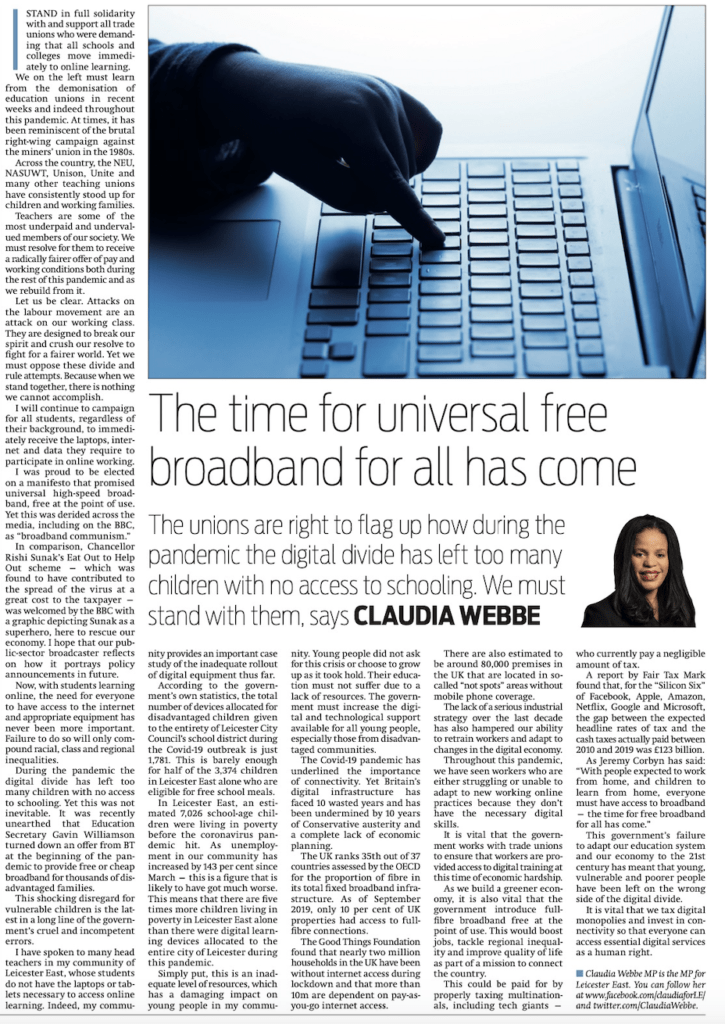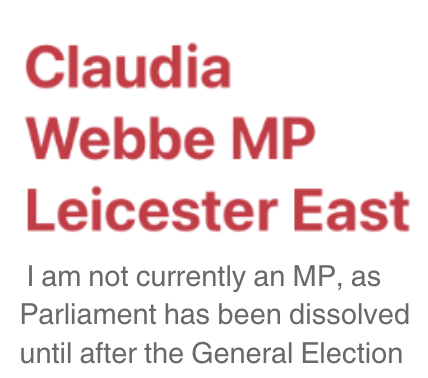
The time for universal free broadband for all has come
By Claudia Webbe MP
The unions are right to flag up how during the pandemic the digital divide has left too many children with no access to schooling. We must stand with them, says CLAUDIA WEBBE
I STAND in full solidarity with and support all trade unions who were demanding that all schools and colleges move immediately to online learning.
We on the left must learn from the demonisation of education unions in recent weeks and indeed throughout this pandemic. At times, it has been reminiscent of the brutal right-wing campaign against the miners’ union in the 1980s.
Across the country, the NEU, NASUWT, Unison, Unite and many other teaching unions have consistently stood up for children and working families.
Teachers are some of the most underpaid and undervalued members of our society. We must resolve for them to receive a radically fairer offer of pay and working conditions both during the rest of this pandemic and as we rebuild from it.
Let us be clear. Attacks on the labour movement are an attack on our working class. They are designed to break our spirit and crush our resolve to fight for a fairer world. Yet we must oppose these divide and rule attempts. Because when we stand together, there is nothing we cannot accomplish.
I will continue to campaign for all students, regardless of their background, to immediately receive the laptops, internet and data they require to participate in online working.
I was proud to be elected on a manifesto that promised universal high-speed broadband, free at the point of use. Yet this was derided across the media, including on the BBC, as “broadband communism.”
In comparison, Chancellor Rishi Sunak’s Eat Out to Help Out scheme — which was found to have contributed to the spread of the virus at a great cost to the taxpayer — was welcomed by the BBC with a graphic depicting Sunak as a superhero, here to rescue our economy. I hope that our public-sector broadcaster reflects on how it portrays policy announcements in future.
Now, with students learning online, the need for everyone to have access to the internet and appropriate equipment has never been more important. Failure to do so will only compound racial, class and regional inequalities.
During the pandemic the digital divide has left too many children with no access to schooling. Yet this was not inevitable. It was recently unearthed that Education Secretary Gavin Williamson turned down an offer from BT at the beginning of the pandemic to provide free or cheap broadband for thousands of disadvantaged families.
This shocking disregard for vulnerable children is the latest in a long line of the government’s cruel and incompetent errors.
I have spoken to many head teachers in my community of Leicester East, whose students do not have the laptops or tablets necessary to access online learning. Indeed, my community provides an important case study of the inadequate rollout of digital equipment thus far.
According to the government’s own statistics, the total number of devices allocated for disadvantaged children given to the entirety of Leicester City Council’s school district during the Covid-19 outbreak is just 1,781. This is barely enough for half of the 3,374 children in Leicester East alone who are eligible for free school meals.
In Leicester East, an estimated 7,026 school-age children were living in poverty before the coronavirus pandemic hit. As unemployment in our community has increased by 143 per cent since March — this is a figure that is likely to have got much worse. This means that there are five times more children living in poverty in Leicester East alone than there were digital learning devices allocated to the entire city of Leicester during this pandemic.
Simply put, this is an inadequate level of resources, which has a damaging impact on young people in my community. Young people did not ask for this crisis or choose to grow up as it took hold. Their education must not suffer due to a lack of resources. The government must increase the digital and technological support available for all young people, especially those from disadvantaged communities.
The Covid-19 pandemic has underlined the importance of connectivity. Yet Britain’s digital infrastructure has faced 10 wasted years and has been undermined by 10 years of Conservative austerity and a complete lack of economic planning.
The UK ranks 35th out of 37 countries assessed by the OECD for the proportion of fibre in its total fixed broadband infrastructure. As of September 2019, only 10 per cent of UK properties had access to full-fibre connections.
The Good Things Foundation found that nearly two million households in the UK have been without internet access during lockdown and that more than 10m are dependent on pay-as-you-go internet access.
There are also estimated to be around 80,000 premises in the UK that are located in so-called “not spots” areas without mobile phone coverage.
The lack of a serious industrial strategy over the last decade has also hampered our ability to retrain workers and adapt to changes in the digital economy.
Throughout this pandemic, we have seen workers who are either struggling or unable to adapt to new working online practices because they don’t have the necessary digital skills.
It is vital that the government works with trade unions to ensure that workers are provided access to digital training at this time of economic hardship.
As we build a greener economy, it is also vital that the government introduce full-fibre broadband free at the point of use. This would boost jobs, tackle regional inequality and improve quality of life as part of a mission to connect the country.
This could be paid for by properly taxing multinationals, including tech giants — who currently pay a negligible amount of tax.
A report by Fair Tax Mark found that, for the “Silicon Six” of Facebook, Apple, Amazon, Netflix, Google and Microsoft, the gap between the expected headline rates of tax and the cash taxes actually paid between 2010 and 2019 was £123 billion.
As Jeremy Corbyn has said: “With people expected to work from home, and children to learn from home, everyone must have access to broadband — the time for free broadband for all has come.”
This government’s failure to adapt our education system and our economy to the 21st century has meant that young, vulnerable and poorer people have been left on the wrong side of the digital divide.
It is vital that we tax digital monopolies and invest in connectivity so that everyone can access essential digital services as a human right.
Claudia Webbe MP is the member of Parliament for Leicester East. You can follow her at www.facebook.com/claudiaforLE and twitter.com/ClaudiaWebbe


